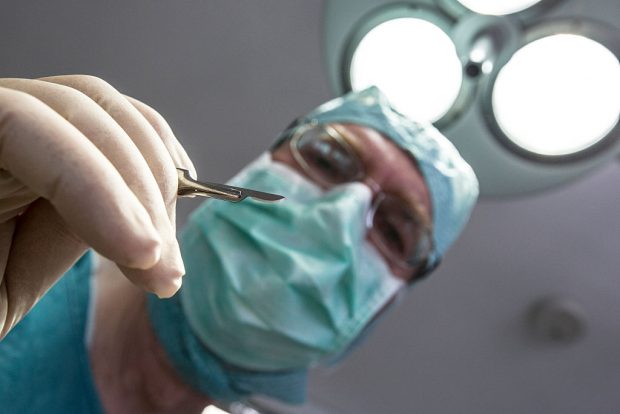Dr Muk asked me whether I’d heard any more news about the Algerian hostage crisis. Had the number of hostages killed been announced yet, for example? ‘I simply don’t understand these Islamist terrorists,’ he added, sadly. ‘They seem absolutely crazy to me. They are brainwashed, I suppose.’ I hadn’t listened to the radio so far today, I said, so I wasn’t up to date. But if you asked me, I said, they quite possibly have a point. Maybe our secular, materialist society is as contemptible as they claim it is. ‘Mm. Mm,’ agreed Dr Muk with surprising readiness.
I was lying on my back and he was slicing open my upper chest with a scalpel. The local area was anaesthetised, so I couldn’t feel a thing. The last time I was under his knife, six months ago, he’d failed to remove the corruption entirely. He’d missed a bit. So here I was again and he was unzipping the scars and ranging wider and deeper with his sharp instruments.
Dr Muk was leaning over me from the right-hand side; his assistant was leaning over me from the left. Half of his assistant’s face was covered by a mask, and she wore glasses, but behind the glasses her blue eyes were wonderfully expressive. She communicated friendliness, reassurance and good humour easily with them. I felt like a child in a cradle being doted on by loving parents.
Dr Muk’s real name is Mukopadhyay, but to his operating team here in Devon he’s Dr Muk. He is a slightly built and very gentle, otherworldly man. I feel at a slight disadvantage in his company, given that our entire acquaintance has consisted of my lying underneath him with my chest bared, and him knifing me, but his delicacy and modesty is such that it is always I who have the impression of being the one deferred to.
The unmistakable sound of the Hammond organ introduction to ‘A Whiter Shade of Pale’ by Procol Harum began playing in the background on the CD player. One of the nurses went over and turned up the volume and sang along to the chorus. ‘Oh, God. She’s off,’ said Steve, whose job as acting quartermaster is to pass out the dressings as and when required. ‘She’s cycling across Cuba next month, aren’t you, Val?’ he said. ‘For charity. She’s going topless.’
Val’s job is to write down certain phrases dictated to her by Dr Muk. Phrases like ‘lesion, right clavicle’ and ‘left anterior chest’. ‘They’ve told us we’ve got to concentrate on the road all the time because of the potholes, so we won’t be seeing much of the countryside, unfortunately,’ she admitted. Then she started singing along to the chorus of ‘Whiter Shade of Pale’ again and Steve clapped his hands over his ears.
‘Don’t you like Procol Harum, then, Steve?’ I said, turning my head to look at him. Steve is about 60 years old. ‘I prefer modern stuff,’ he said. ‘Garage?’ I said. ‘Yes, I like some garage,’ he said with dignity. ‘Ever taken an e?’ I said. ‘He’s done everything, Steve has,’ warned Val. ‘Haven’t you, Steve?’ ‘Yes, I have taken one, actually,’ said Steve, quietly proud. ‘Once. At a Conservative club. I didn’t notice any effect because I was drunk. We’d been on a coach tour of all the Conservative clubs in the area and this bloke got some out and handed them round for a laugh.’
I knew what he meant, I said, because exactly the same thing happened to me the only time I ever smoked heroin. I was so drunk I didn’t notice any effect whatsoever. ‘Was that in a Conservative club as well?’ said Val. ‘No, in a mental hospital,’ I said. ‘But there can be no justification for such brutality, even as a means of expressing disagreement,’ said Dr Muk. I looked up at his face. His concentration was on his surgical incisions, his expression was one of gentleness and competence. But a part of his mind dwelt still on those Islamic militants.
‘Perhaps they think it’s the only language that hypocrites like us are likely to fully understand,’ I said.
‘Hypocrites?’ exclaimed Dr Muk’s assistant. ‘Us? What about them? They’re the biggest hypocrites of the lot! What about them and alcohol? And sex!’ She wasn’t having any more of my nonsense and swabbed at the blood coming out of my chest with considerably more vigour than she had done hitherto. ‘Mm. Mm,’ agreed Dr Muk.
Another chorus of ‘Whiter Shade of Pale’ came around again — the final one — and Val joined in, with feeling. Steve clapped his hands over his ears and retreated over to the wall. Dr Muk paused briefly to adjust his magnifiers, and then bent to his task again with renewed concentration.







Comments